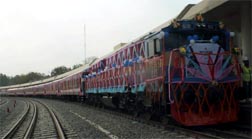C T Online Desk: The much-awaited Jamuna Rail Bridge, the country’s largest dedicated railway bridge, was formally inaugurated at 10am on Tuesday, marking a significant milestone in Bangladesh’s railway connectivity.
Following this inauguration, trains will be able to run at a speed of 120 km/h, revolutionising rail communication between Dhaka and the northwestern region, said Project Director of the Jamuna Rail Bridge Project, Al Fattah Masudur Rahman.
Railways Secretary Md Fahimul Islam attended the inauguration as the chief guest at Ibrahimabad Railway Station on the eastern bank of the Jamuna Rail Bridge.
Japanese Ambassador to Bangladesh Saida Shinichi and the Director General of JICA’s South Asia Department were present as special guests at the event, said the Project Director.
A new era in rail communication
After the trial runs, the bridge will now be fully operational.
With its introduction, not only will railway travel time be significantly reduced, but it will also fulfill a long-standing dream of better connectivity and economic growth for the northwestern region.
Previously, the Jamuna River had left Sirajganj and the northern districts isolated, depriving them of adequate development.
While the construction of the Jamuna Multipurpose Bridge in 1998 established both road and rail connections, cracks appeared in the structure by 2008, limiting train speeds to just 20 km/h. Since then, approximately 38 trains crossed the bridge daily at reduced speeds, affecting transportation efficiency.
To address this issue, on 3 March 2020, authorities initiated the construction of a dedicated railway bridge 300 metres upstream of the Jamuna Multipurpose Bridge. The foundation stone was laid on 29 November 2020, and piling for the first pillar began in March 2021.
Massive infrastructure and investment
The 4.8 km-long Jamuna Rail Bridge features 50 pillars and 49 spans. With additional railway embankments and loops, the total railway track installed spans 30.73 km.
Initially, the project was budgeted at Tk9,734.07 crore, but the cost later increased to Tk16,780.96 crore. Of this, 27.60% was financed domestically, while 72.40% was funded by a loan from the Japan International Cooperation Agency (JICA).
Japanese company OTG and IHI Joint Venture implemented the project, with contributions from five major Japanese contractors. Over 7,000 workers from Japan, Vietnam, Nepal, Australia, the Philippines, and Bangladesh worked for four years to complete the bridge.













